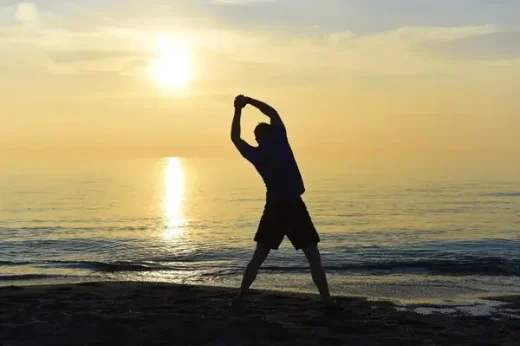With longer days and sunny skies, summer seems like the perfect time to get active. Whether it’s jogging in the park, outdoor yoga, or beach workouts, exercising under the sun can feel energizing. But is working out in hot weather really safe? And how should you adjust your routine to avoid overheating or dehydration?
In this comprehensive summer workout guide, we’ll cover everything you need to know best times to exercise, what to wear, whether you should eat before training, and why sweating doesn’t always mean fat loss.

Is Exercising in Hot Weather Harmful?
Exercising in the heat can be both beneficial and risky, depending on how your body responds and how well you prepare. On one hand, summer workouts boost your metabolism and can feel more intense due to higher heart rates. On the other, hot temperatures increase the risk of heat-related illnesses such as:
- Heat exhaustion
- Heatstroke
- Dehydration
- Muscle cramps
- Dizziness or fainting
If you’re not properly hydrated or if your body can’t regulate internal temperature efficiently, even a light workout can lead to overheating. That said, moderate-intensity exercise in warm weather is generally safe as long as you listen to your body and make proper adjustments.
What Is the Best Time to Exercise in Summer?
Timing is everything when working out in summer. The goal is to avoid the hottest parts of the day, typically between 11 AM and 4 PM. Instead, aim for:
- Early morning workouts (before 9 AM): Cooler air, lower sun intensity, and better oxygen levels.
- Evening workouts (after 6 PM): Still warm, but less risk of UV exposure and heatstroke.
Indoor training with fans or air conditioning is a safer alternative during heatwaves or high humidity days. If you’re doing outdoor activities like running, cycling, or walking, always check the UV index and humidity level both can amplify the danger even when temperatures seem manageable.
Is Walking Under the Sun Dangerous?
A sunny walk might sound harmless, but walking under direct midday sun can pose serious risks, especially in humid environments. UV radiation, when combined with physical exertion, can lead to:
- Heatstroke
- Dehydration
- Sunburn
- Fatigue
To walk safely outdoors in summer:
- Choose shaded routes like parks or tree-lined paths.
- Walk early in the morning or around sunset.
- Apply broad-spectrum sunscreen with at least SPF 30.
- Wear a hat and sunglasses for protection.
- Bring a water bottle to sip every 10–15 minutes.
If your heart rate rises quickly, or you start to feel dizzy, stop immediately and find a cool spot to rest.
What Should You Wear When Exercising in Summer?
Your workout wardrobe can make or break your summer fitness experience. The right outfit keeps you cool, prevents chafing, and allows your body to sweat efficiently.
Ideal clothing for hot-weather workouts includes:
- Lightweight, breathable fabrics like moisture-wicking polyester or bamboo.
- Loose-fitting tops and shorts to allow airflow.
- Light-colored clothes that reflect sunlight instead of absorbing heat.
- Supportive, ventilated shoes with moisture-absorbing socks.
- UV-protective gear such as running caps or arm sleeves.
Avoid cotton (which holds onto sweat) and dark colors (which trap heat). For women, sports bras made from quick-dry material are essential. For men, opt for tanks or shirts with mesh panels.
Is It Safe to Exercise on an Empty Stomach?
Training on an empty stomach known as fasted cardio has become popular among those aiming to burn more fat. But is it right for summer workouts?
Benefits of fasted training:
- May increase fat utilization (especially during low-intensity workouts)
- Can be convenient for early morning routines
- May support appetite control post-exercise
Risks in hot weather:
- Increased chance of dizziness or lightheadedness
- Faster dehydration
- Weakened performance or lower endurance
- Greater risk of hypoglycemia, especially in long workouts
If you plan to work out in summer without eating, keep it short and low to moderate in intensity. Walking, stretching, or light yoga are safer fasted activities. Always drink water before and during your session.
For higher-intensity workouts, a small snack like a banana, a slice of toast, or a protein smoothie 30–60 minutes beforehand provides energy and minimizes risks.
Does Sweating Help You Lose Weight?
A common myth in fitness culture is that the more you sweat, the more fat you burn. The truth? Sweating is your body’s cooling system, not a direct measure of fat loss.
What sweating actually does:
- Lowers body temperature
- Releases water and salt, not fat
- Causes temporary weight loss through fluid loss
When you sweat heavily, you might weigh less temporarily but it’s mostly water weight, which is regained as soon as you rehydrate.
To burn fat, focus on calorie-burning activities like cardio, resistance training, and a healthy diet not excessive sweating.
However, sweating does have benefits:
- Helps eliminate certain toxins
- Improves skin appearance (via temporary pore cleansing)
- Indicates cardiovascular exertion
But never force sweating with excessive layers or plastic wraps that only increases the risk of overheating without providing any additional fat-burning advantage.
Top Tips for Exercising Safely in Hot Weather
- Hydrate, hydrate, hydrate: Drink before, during, and after your workout.
- Know your limits: Slow down or stop if you feel faint, nauseous, or dizzy.
- Avoid heavy meals before exercise in the heat opt for light, energy-boosting snacks.
- Include electrolyte-rich drinks if you sweat heavily (especially during long sessions).
- Use cold towels post-workout to cool the body quickly.
- Plan recovery: Summer heat makes post-exercise rest and rehydration even more important.
Erdem Hospital Offers Year-Round Support for Safe, Sustainable Fitness

Whether you’re beginning a new fitness routine or seeking professional guidance for safe weight loss, Erdem Hospital in Istanbul provides evidence-based, patient-centered care for individuals at every stage of their wellness journey. With over 37 years of medical experience, our experts help patients from around the world achieve their goals safely even during the hottest months of the year.
From personalized nutrition and hydration plans to non-surgical body shaping, sports injury rehabilitation, and tailored weight management programs, Erdem Hospital ensures that your body remains strong, healthy, and protected whatever the season.